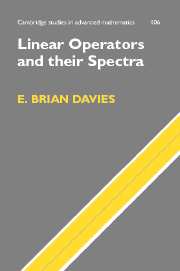Book contents
- Frontmatter
- Contents
- Preface
- 1 Elementary operator theory
- 2 Function spaces
- 3 Fourier transforms and bases
- 4 Intermediate operator theory
- 5 Operators on Hilbert space
- 6 One-parameter semigroups
- 7 Special classes of semigroup
- 8 Resolvents and generators
- 9 Quantitative bounds on operators
- 10 Quantitative bounds on semigroups
- 11 Perturbation theory
- 12 Markov chains and graphs
- 13 Positive semigroups
- 14 NSA Schrödinger operators
- References
- Index
2 - Function spaces
Published online by Cambridge University Press: 08 January 2010
- Frontmatter
- Contents
- Preface
- 1 Elementary operator theory
- 2 Function spaces
- 3 Fourier transforms and bases
- 4 Intermediate operator theory
- 5 Operators on Hilbert space
- 6 One-parameter semigroups
- 7 Special classes of semigroup
- 8 Resolvents and generators
- 9 Quantitative bounds on operators
- 10 Quantitative bounds on semigroups
- 11 Perturbation theory
- 12 Markov chains and graphs
- 13 Positive semigroups
- 14 NSA Schrödinger operators
- References
- Index
Summary
Lp spaces
The serious analysis of any operators acting in infinite-dimensional spaces has to start with the precise specification of the spaces and their norms. In this chapter we present the definitions and properties of the Lp spaces that will be used for most of the applications in the book. Although these are only a tiny fraction of the function spaces that have been used in various applications, they are by far the most important ones. Indeed a large number of books confine attention to operators acting in Hilbert space, the case p: = 2, but this is not natural for many applications, such as those to probability theory.
Before we start this section we need to make a series of standing hypotheses of a measure-theoretic character. We recommend that the reader skims through these, and refers back to them as necessary. The conditions are satisfied in all normal contexts within measure theory.
(i) We define a measure space to be a triple (X, Σ, μ) consisting of a set X, a σ-field Σ of ‘measurable’ subsets of X, and a non-negative countably additive measure μ on Σ. We will usually denote the measure by dx.
(ii) We will always assume that the measure μ is σ finite in the sense that there is an increasing sequence of measurable subsets Xn with finite measures and union equal to X.
(iii) We assume that each Xn is provided with a finite partition εn, by which we mean a sequence of disjoint measurable subsets {E1, E2, …, Em(n)}, each of which has positive measure |Er| : = μ(Er). The union of the subsets Er must equal Xn.
[…]
Information
- Type
- Chapter
- Information
- Linear Operators and their Spectra , pp. 35 - 66Publisher: Cambridge University PressPrint publication year: 2007
